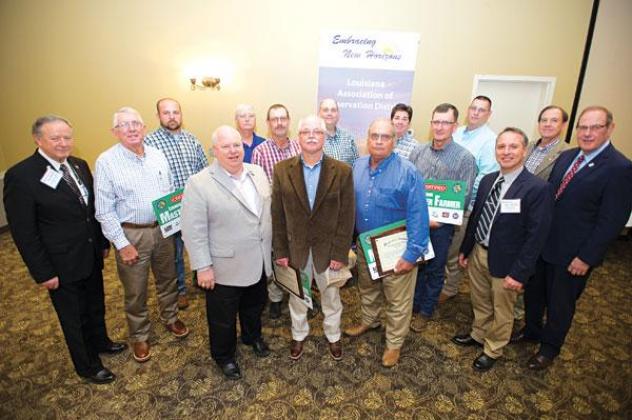
Olivia McClure
Fourteen people who have completed training through the Louisiana Master Farmer program, an initiative led by the LSU AgCenter and several other organizations to help agriculture producers adopt practices that promote good environmental stewardship, received their certifications on Jan. 12.
The graduates were honored at a luncheon during the 71st annual meeting of the Louisiana Association of Conservation Districts in Alexandria. Also recognized were 11 previous Master Farmer graduates who completed recertification as well as one farmer selected for the Outstanding Master Farmer Award.
A total of 236 people have been certified as Master Farmers since 2001. The program educates producers about voluntarily implementing research-based management practices that address environmental concerns.
To become as a Master Farmer, participants must attend field days and classroom lectures as well as develop a conservation plan for their farm. After graduating, annual continuing education hours and recertification every five years are required.
“Louisiana Certified Master Farmers are proactive in protecting all the natural resources by implementing best management practices in a resource management system that also prevents nutrient and sediment loss,” said program coordinator Ernest Girouard.
The 2016 graduates are Charlie Fontenot, St. Landry Parish; J.D. Fontenot, St. Landry Parish; Scott Fontenot, Evangeline Parish; Todd Fontenot, Evangeline Parish; Keith McCallum, West Feliciana Parish; Ty Rogers, West Carroll Parish; George Shepherd, Madison Parish; Joshua Sonnier, Vermilion Parish; Horace Steve Theriot, Lafayette Parish; Roy Varnado, Acadia Parish; James Wicker, Union Parish; Bill Wild, Jefferson Davis Parish; Tim Wild, Jefferson Davis Parish; and Jimmy Wilson, Morehouse Parish.
The Outstanding Master Farmer Award recipient was Donavon Taves, an East Carroll Parish farmer who is president of the Louisiana Association of Conservation Districts. He thanked AgCenter personnel for their patience in teaching him about conservation practices and program partners for their support.
“What they’re giving to the Master Farmer program is something that’s going to be here for years to come. It’s going to be evident on our farms as we hand it down,” said Taves, a 2008 program graduate who received his recertification on Jan. 12. “It’s a wonderful program, and I’m deeply honored to receive this.”
In addition to the AgCenter, participating organizations include the Louisiana Farm Bureau, the Louisiana Department of Agriculture and Forestry, the Louisiana Cattlemen’s Association and the U.S. Department of Agriculture Natural Resources Conservation Service.
John Pitre, NRCS state resource conservationist in Louisiana, said his office is proud to be part of the program because it highlights Louisiana farmers’ commitment to environmental stewardship.
LSU Vice President for Agriculture Bill Richardson told the newly certified Master Farmers and others attending the event that the partner organizations’ contributions have helped create one of the most successful such programs in the country.
“Everybody has a key role to play in this,” he said.
Richardson also gave an update on Louisiana’s budget crisis, which he said continues to present challenges to the AgCenter.
“It’s going to be very difficult with decreased resources to keep the level of staffing out there that you expect,” he said, adding that reorganization of personnel and resources will be required to maximize their effect.
Richardson, who also is dean of the LSU College of Agriculture, expressed concern that additional cuts to the popular TOPS scholarship program could cost the college some of the high-quality students it has recruited recently. And he warned farmers that some of the tax exemptions they currently receive are likely to be scrutinized and possibly revoked when the state legislature meets this spring.
Mike Strain, commissioner of the Louisiana Department of Agriculture and Forestry, also addressed the group, urging them to contact their legislators to voice support for agriculture programs. Funding that his office puts toward soil and water conservation is critical to farmers’ productivity and the future of the industry, said Strain, who completed the Master Farmer program in 2013.
While money from the federal Emergency Watershed Protection Program is helping support such efforts in Louisiana, Strain said, it’s still important to advocate for strong funding at the state level.
“It is absolutely imperative to use every bit of science, every bit of technology, every bit of innovation to meet the growing needs of the world population,” Strain said.
